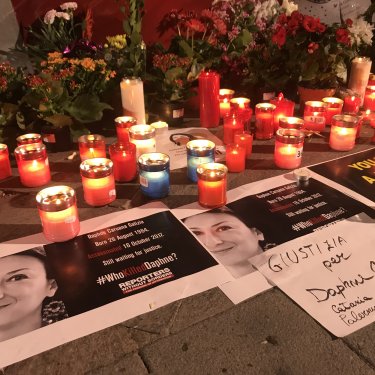Malta: Three years on, pursuit of justice for Daphne Caruana Galizia stalled by constant obstacles and lack of press freedom reform

Three years after the assassination of journalist Daphne Caruana Galizia, the pursuit of justice remains elusive as the 10 month-old administration of Prime Minister Robert Abela fails to implement meaningful reforms. Those accused of planning and carrying out the attack have still not been brought to trial, whilst Abela has attempted to interfere with the ongoing public inquiry. Meanwhile, the country’s media climate remains deeply divided, and journalists who continue to pursue in-depth investigative reporting do so at great risk. Reporters Without Borders (RSF) calls again for full justice for Daphne Caruana Galizia and broader press freedom reforms without further delay.
As the three-year anniversary of the assassination of journalist Daphne Caruana Galizia is marked on 16 October, the pursuit of justice continues to be stalled by constant obstacles, as well as a worrying press freedom climate and broader lack of reforms in Malta.
“Three years is far too long for a reign of impunity to continue for Daphne Caruana Galizia’s assassination. It’s also far too long for a lack of reforms to remedy the broader systemic failings that this horrific crime exposed. The international community has clearly identified the reforms needed - and now it must act to hold the Maltese government to account for their implementation without further delay. Allowing impunity to fester in the heart of the EU leaves the door open for further attacks on journalists. A clear signal must now be sent that this will not be allowed to happen again in the EU, or anywhere,” said RSF’s Director of International Campaigns Rebecca Vincent.
At the two-year mark, RSF and The Shift News published a detailed report outlining the Maltese authorities’ failings in the aftermath of Caruana Galizia’s assassination, and international recommendations to address the systemic problems that allowed for the attack to occur and ensure that justice is served. A full year later, these recommendations remain largely unheeded, with the exception of the establishment of a public inquiry into Caruana Galizia’s assassination - a hard-won advocacy battle secured through international pressure, cumulating in a deadline being set by a key resolution of the Parliamentary Assembly of the Council of Europe (PACE) in June 2019.
However, the independence and impartiality of the public inquiry are currently under threat, with new Prime Minister Robert Abela attempting to interfere with the work of the Board of Inquiry by imposing a time limit. Indeed, in the first 10 months of his tenure, Abela has shown that his administration will largely perpetuate the approach of his predecessor, Joseph Muscat, who stepped down as Prime Minister in January following mass civil society protests connected to developments in Caruana Galizia’s case. On 5 October, Muscat finally also resigned from parliament.
In a trip to Malta when travel restrictions were lifted in July, RSF interviewed journalists from a range of independent media outlets who painted a worrying picture of continued deep divisions among the Maltese media community. They also reported that despite early indications of more superficial reforms by Abela - such as ceasing the continuous destruction of the Valletta memorial to Caruana Galizia - at the core, nothing had changed. Although Abela is not perceived as being as openly hostile towards the media as his predecessor, journalists report experiencing more difficulty than ever in obtaining information or access to government officials.
Some journalists RSF spoke to also criticised the Abela administration’s financial assistance to media outlets as a Covid-19 response measure, through direct subsidies and advertising agreements - the terms of which lacked transparency. RSF is aware of reports of attempts by government bodies to influence the editorial policies of some outlets that accepted the government funding.
Meanwhile, in Caruana Galizia’s case, progress has once again stalled. Accused hitmen Alfred Degiorgio, George Degiorgio and Vincent Muscat have been detained since December 2017, but have yet to be brought to trial. Self-confessed middleman and key witness Melvin Theuma was hospitalised in July with extensive injuries, including a slit throat, which have been attributed to self-harm. The compilation of evidence continues against alleged mastermind Yorgen Fenech, with his defence lawyers arguing that he will not be given a fair trial, and claiming that the “real masterminds” are still free.
RSF calls again for full justice for Caruana Galizia’s assassination, which means everyone involved in every aspect of this case is identified and prosecuted to the full extent of the law - all hitmen, all middlemen, and all masterminds. Important steps towards justice include protecting the independence and impartiality of the ongoing public inquiry, and inviting a Europol Joint Investigation Team to assist. RSF also calls for implementation without further delay of key international recommendations to address broader systemic failings in Malta - starting with those of the June 2019 PACE resolution.
Malta has fallen 34 places in RSF’s World Press Freedom Index since Caruana Galizia’s assassination, and is currently ranked 81st out of 180 countries.
Notes:
- With travel to Malta not possible this year in light of Covid-19 related restrictions, RSF will mark the anniversary in small, distanced vigils in London and Berlin, and by taking part in a series of online events.
- Press contact: Rebecca Vincent at +44 (0)207 324 8903 or [email protected].



